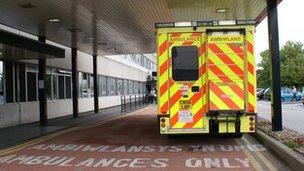Welsh ambulance service response times improve
- Published

The ambulance service has not met the Welsh government response target for eight months
Ambulance response times in Wales have improved for the first time since August, according to the latest data.
In January, the ambulance service responded to 59.6% of the most urgent (Category A) calls within eight minutes compared to 56.1% in December.
Opposition parties said it was not good enough that the service still failed to meet the Welsh government target of 65% for the eighth month in a row.
The Welsh government said snow put pressure on the service in January.
Figures show that there were 5.9% (14,600) fewer Category A calls in total last month.
The statistics were published on the day of a Welsh Conservative debate on the ambulance service in the Welsh assembly.
The Tories are calling on the Welsh government to:
Increase the number of emergency ambulances operating in Wales.
Ensure that Wales has an adequate network of ambulance stations across the country.
Provide an assurance that the on-going ministerial review of the Welsh Ambulance Service NHS Trust will deliver improved response times.
Darren Millar AM, who will lead the debate as shadow health minister, said: "Despite the hard work of frontline staff, waits are still too long, targets mean little, and service performance lags behind other parts of the UK."
'Increasing demand'
Kirsty Williams, leader of the Welsh Liberal Democrats, also pointed to the "unacceptable postcode lottery" of ambulance response times.
"What really stands out is the huge variance in performance across Wales," she said.
"It is disgraceful that over half of urgent calls in either the Isle of Anglesey or Rhondda Cynon Taf were not responded to within the target time, while in areas such as Conwy, over 70% of calls met their target."
The Welsh government said the statistics should be seen "in the context of wider pressure on the NHS emergency care system and rapidly increasing demand", including a 6% increase in calls categorised as life threatening since September 2012.
A spokesperson said: "Also, the icy and snowy conditions put significant pressure on services during January, throughout which NHS staff remained as dedicated as always."
They said Health Minister Lesley Griffiths was "well aware of the challenges facing the ambulance service in Wales and recognises performance needs to improve" prompting her to order a review last November.
The review is due to finish at the end of March, with a report to the minister following shortly after.
- Published30 January 2013
- Published13 December 2012
- Published8 November 2012
- Published27 September 2012